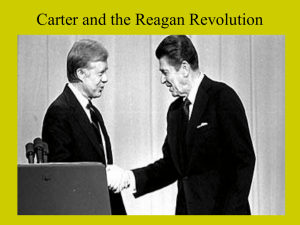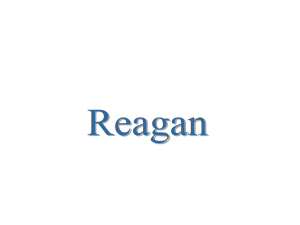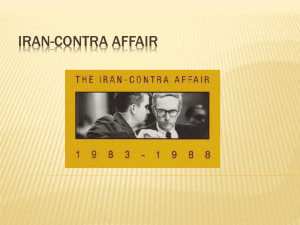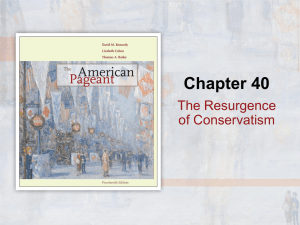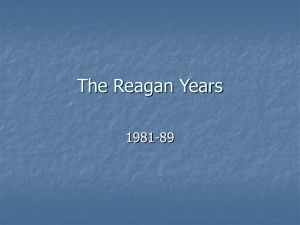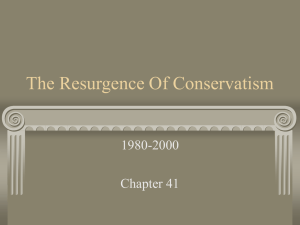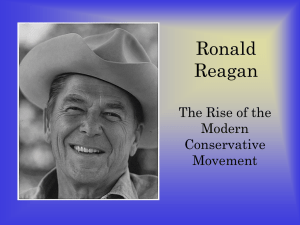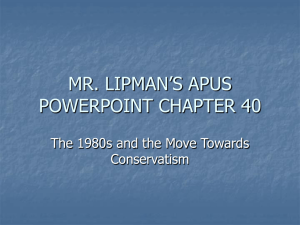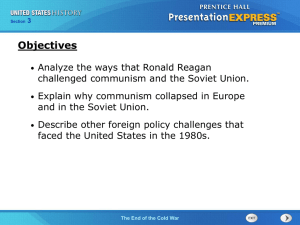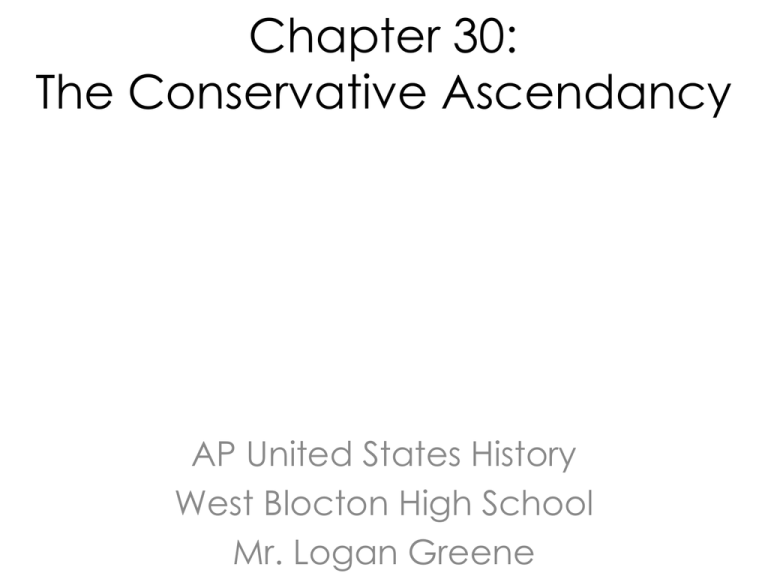
Chapter 30:
The Conservative Ascendancy
AP United States History
West Blocton High School
Mr. Logan Greene
Chapter Objectives
• What economic and social issues led up to the
Reagan administration?
• What economic and social changes occurred
during the Reagan administration?
• What foreign policy measures did Reagan
employ in dealing with the Middle East and the
Soviet Union?
The Troubled 70’s Economy
• Much of the 1970s economic trouble
started with the Arab-Israeli war in 1973
• Upon the war breaking out, OPEC began
an embargo of oil to all Israeli allies
(including the US)
• As the embargo hit, prices rose across the
board in rent and energy
• Nixon, and later Ford, responded by taking
measures to lower US oil consumption
• However, the economy stagnated
Lean Years Presidents
• The Presidencies of Ford and Carter
presided over a country dealing with a very
depressed economy and a disillusioned
citizenry
• Nixon’s destruction of trust, coupled with
left over bad feelings from Vietnam left
many American’s doubting the
government
• Overall, both Ford and later Carter
presided over quiet administrations with
little legacies
New Urban Politics
• The 1970s saw a rise in new political forces
in the cities
• African-Americans made major gains in
many cities, particularly in the South
• College towns saw an incredible rise in now
adult liberal political leaders from the
former counter culture movement
• Affirmative Action led to many calls of Civil
Rights turning into reverse racism
The Environment
• By the 1970s the environment was in serious
danger due to lack of government regulation
and oversight
• In 1979 disaster was narrowly averted at the Three
Mile Island Nuclear Plant in Pennsylvania
• As well, in Love Canal, NY and the Everglades in
Florida showed the effects of drastic toxic
dumping
• Congress passed the EPA (Environmental
Protection Agency) to control the issues in 1970
and gave it more power as the decade grew
The New Right Conservatism
• By the end of the 1970s, evangelical
Christians had become the center of the
new Right and the money supporting the
Republican Party
• This could be seen with the increasingly
politician sermons of Jerry Falwell, Pat
Robertson, and Jim Bakker
• The New Right was also supported by major
corporations funding formerly liberal
thinkers who blamed the 1960s for the
“destruction” of the country
Anti-ERA, Antiabortion
• The New Right focused on attacking the passage
of the new Equal Rights Amendment which
stated “equality of rights shall not be abridged on
account of sex”
• The New Right saw the amendment as a threat
and mobilized conservatives to prevent its
passing
• As well, Conservatives focused on attacking the
legalization of abortion in Roe v. Wade
The Cold War Thaw
• By the 1970s the budget of the military was
growing much faster than the economy
• The Helsinki Accords and the SALT 1 treaty
showed the easing of Cold War tensions
• Despite issues in third world areas the Cold
War was thawing
“Moral” Foreign Policy
• Carter’s confessed inexperience in Foreign Policy
he reacted by guaranteeing a new “morality” in
foreign policy
• Carter reformed the CIA, managed the Camp
David Accords setting peace between Egypt
and Israel, and negotiated the transition of the
Panama Canal to Panama
• However, Carter mishandled issues in Nicaragua
• With the Soviet invasion of Afghanistan Carter
ended détente and the idea of peace fell apart
The Iran Hostage Crisis
• In November of 1979 Iranian
fundamentalists seized the US embassy in
Tehran and held 52 American employees
hostage
• The crisis lasted 444 days
• Carter failed miserably in several attempts
to free the hostage
The 1980 Election
• By the 1980 election Americans were tired
of Carter’s idealism and the Conservative
Ascendency was in full swing
• Ronald Reagan, a former actor, won a
landslide victory over Carter based mainly
on his ability communicate his policies to
the American people
Reaganomics
• Reagan sought to complete a 180 degree turn in US
economic thought since the New Deal
• Reaganomics depended on
– Lower income taxes on persons and industry
– Increase defense spending
– Deregulate industry
• Reaganomics is supply side economics preaching an
increase in supply and a cut in government spending
(except for defense)
• The idea was to help the rich and watch the money
“trickle down” to the middle and lower classes
Reaganomics
• Reaganomics saw huge gains in big
business, industry, and the rich
• However, spending on public works,
education, welfare, the environment, and
research were nearly completely wiped out
• As well, defense spending hit a total of $2
trillion during the Reagan administration
• Unfortunately, scandals increased as big
business was not regulated or kept in check
1984 Election
• As Reagan entered the 1984 election
doubts existed due to his huge defense
spending
• However, Reagan defeated Democrat
Walter Mondale in every state except
Minnesota and the District of Columbia
Economics
• Overall Reaganomics had mixed results
• However, Reagan’s biggest failing as President
came in the budget
• Upon running for President in 1980 Reagan
promised to balance to the budget; however, he
did the opposite as he inaugurated a new era of
major deficit spending
• Under Reagan the national debt tripled from $914
Billion to $2.7 Trillion
• As well, the lack of regulation saw several
scandals on the stock market break out
Celebration of Wealth
• The uber-rich did very well during the Reagan
presidency
• The ideals of the Reagan presidency became
apparent as money, status, and power became
the goals for Americans
• The gap between rich and poor grew by huge
numbers during the 1980s as the rich got richer
and the poor got poorer
• Even popular culture focused on the rich with
shows like Dallas and Dynasty showing lavish
lifestyles
Two-Tier Society
• The gap between rich and poor exploded
during the 1980s
• As well, the gap between financial success
of the races exploded as overall AfricanAmericans lost economic power
• As well, women lost a large amount of
buying power as the wage gap between
the sexes collapsed in the 1980s
Epidemics
• The society of 1980s also dealt with several
epidemics
• The new disease of AIDS began to be understood
as not simply a homosexual disease but an STD
that can effect anyone
• Originally creating fear of anyone with the
disease, by the late 1980s a better understanding
of the disease led to a reduction in new cases
• Sadly homelessness increased dramatically as
more people fell below the poverty line
• As well, an explosion in hard drugs such as
cocaine and heroine appeared in the country
Foreign Policy
• Reagan altered drastically the ideals of
détente and instead focused upon the
Soviet Union as an “evil empire”
• Reagan’s SDI (Strategic Defense Initiative)
of inventing satellites to shoot down rockets
was not only ineffective and expensive but
also angered the Soviets who saw it as a
first strike advantage
The Reagan Doctrine
• Reagan reinvigorated the strategy of the United
States intervening anywhere in the world to stop
Communism
• The idea in the Western Hemisphere was that all
problems in Central America were caused by Fidel
Castro and the Communist government of Cuba
• Reagan’s administration interfered in Nicaragua and
El Salvador with ugly results
• In Nicaragua the Reagan administration interfered
through the Contras, or Nicaraguan exiles, by
spending $19 million dollars to arm them
Iran-Contra
• As the US continued to fight a secret war in
Nicaragua the CIA had to find a new way to
send money
• Regan secretly opened talks with Iran
• He agreed to sell arms to Iran in exchange for
help freeing hostages
• This money was then used to fight in Nicaragua
• The story broke and the administration was
investigated with Lieutenant Colonel Oliver North
taking most of the blame
• Reagan and Bush’s roles were never fully
discovered
Collapse of Communism
• During the late 1980s the Soviet Union suffered
from major political change
• By 1985 a new, milder Soviet leader emerged:
Mikhail Gorbachev
• Gorbachev preached glasnost (openness) and
perestroika (restructuring of the economy)
• Political change to mirror this economic change
proved revolutionary as the Berlin wall came
down in November 1989
• By 1991 the Soviet Union had collapsed as
Gorbachev resigned amidst a coup and
democratic elections were held across the region
Chapter Objectives
• What economic and social issues led up to the
Reagan administration?
• What economic and social changes occurred
during the Reagan administration?
• What foreign policy measures did Reagan
employ in dealing with the Middle East and the
Soviet Union?

